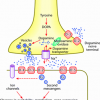Dairy seems to get a free pass, as do other animals products high in PUFA content.
Animal products are not high in PUFAs, they are mostly saturated and mono-unsaturated fatty acids.
Butter: 81% fat, 3.0% PUFA, PUFA = 4% of fatty acids.
Beef tallow: 100% fat, 4.0% PUFA, PUFA = 4% of fatty acids.
Lamb tallow: 100% fat, 7.8% PUFA, PUFA = 8% of fatty acids.
Pork lard: 100% fat, 11.2% PUFA, PUFA = 11% of fatty acids.
Granted, pork is a little higher in PUFA, but ruminants and their dairy are low in PUFAs.Compare:
Brazil nuts: 66% fat, 20.6% PUFA, PUFA = 31% of fatty acids.
Cashews: 43% fat, 7.8% PUFA, PUFA = 18% of fatty acids.
Almonds: 49% fat, 12.1% PUFA, PUFA = 25% of fatty acids.
Coconut: 33% fat, 0.4% PUFA, PUFA = 1% of fatty acids.
Macademia: 75% fat, 1.5% PUFA, PUFA = 2% of fatty acids.
Peanuts: 49% fat, 15.6% PUFA, PUFA = 32% of fatty acids.
Apart from coconut and macademia, nuts have many fold the PUFA content as meat/dairy. Brazil/peanuts have nearly 8 times the PUFA as butter/beef tallow.
All data: CRONometer.com


























































